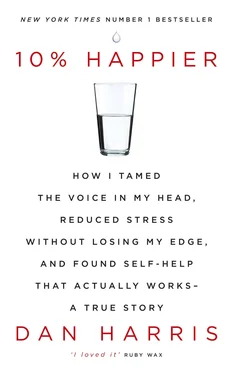This was my major beef with Tolle. Setting aside my qualms about his flowery writing, questionable claims, and bizarre backstory, what I truly could not abide was the lack of practical advice for handling situations like this. He delivered an extraordinary diagnosis of the human condition with basically no action plan for combating the ego (never mind for achieving living-on-a-park-bench superbliss).
How do we do a better job of staying in the Now? Tolle’s answer: “Always say ‘yes’ to the present moment.” How do we achieve liberation from the voice in the head? His advice: simply be aware of it. “To become free of the ego is not really a big job but a very small one.” Yes, right. Easy. But if it were this uncomplicated, wouldn’t there be millions of awakened people walking around?
Then there was an even larger question: Even if I had been able to recognize that my umbrage over not being included in inauguration coverage consisted of mere thoughts, should I have simply ignored them? I could see the value of recognizing thoughts for what they are—fleeting, gossamer, unsubstantial—but aren’t some thoughts connected to concrete realities that need to be addressed?
In his books, Tolle repeatedly denigrated the habit of worrying, which he characterized as a useless process of projecting fearfully into an imaginary future. “There is no way that you can cope with such a situation, because it doesn’t exist. It’s a mental phantom,” he wrote. But, while I understood the benefit of being in the Now, the future was coming. Didn’t I have to prepare? If I didn’t think through every permutation of every potential problem, how the hell would I survive in a competitive industry? Furthermore, wasn’t the restless ego the source of mankind’s proudest achievements? Sure, it was probably responsible for ills such as war, child abuse, and Pauly Shore movies, but hadn’t human striving also given us the polio vaccine, Caravaggio’s paintings, and the iPhone?
And yet, and yet . . . I was aware, of course, that my chattering mind was not entirely working in my favor. I was pretty sure that staring at my hairline or brooding on my couch was not time well spent. I used to think pressing the bruise kept me on my toes. Now I realized those moments mostly just made me unhappy.
Tolle was forcing me to confront the fact that the thing I’d always thought was my greatest asset—my internal cattle prod—was also perhaps my greatest liability. I was now genuinely questioning my own personal orthodoxy, my “price of security” mantra, which had been my operating thesis since, like, age eight. All of a sudden, I didn’t know: Was it propulsive—or corrosive?
I wanted to excel, yes—but I also wanted to be less stressed in the process. This strange little German man seemed to raise the tantalizing possibility of doing both, but the books were not at all explicit about how to do so—at least not in a way that I understood.
So I decided: I needed to meet this guy.
I ran into Felicia in the hallway at work. “Let’s book Eckhart Tolle for an interview,” I said. “We could do it as a ‘Sunday Profile,’ ” a weekly feature we’d recently decided to launch.
It was as if I’d told her that she’d hit the Powerball, or been chosen for beatification. She was beaming. Unlike me, she did not harbor suspicions that Tolle might be a fruitcake. She was all in.
A couple of days later, she reported back that Tolle, who apparently rarely granted interviews, had said yes. He’d be in Toronto in a few weeks hence, giving a sold-out speech, and we’d been granted a one-hour audience. “They’re being really strict about the time limit,” she said, but she was still giddy.
I flew in from New York on the morning of the interview. When I arrived at the hotel room where we’d be shooting, Felicia was there with the camera crew and a clean-cut young Australian guy named Anthony who appeared to be Tolle’s right-hand man. I’d expected a larger staff, but it was just this one guy.
As we awaited the arrival of the Great Man, Anthony told me his story. He’d read some of Tolle’s books, called him up, and asked for a job. When Tolle said yes, Anthony packed all his stuff and moved from Australia to Vancouver, where Tolle lived. Anthony struck me as reasonably normal, with his neatly gelled blond hair and pressed shirt. He discussed his boss with genuine admiration but not adulation; nothing in his bearing screamed “cult” to me.
Shortly thereafter, there was a knock on the door, and Tolle entered. The first thing I noticed was that he was small. Smaller than me, and I’m about five-foot-nine on days when I’ve used Bianca’s volumizing shampoo. No entourage, just him. He had none of the swagger of a man who’d sold tens of millions of books and had a one-man industry of speaking gigs, CDs, and “inspiration cards.” He walked up and introduced himself with a handshake. He was unassuming, but not shy. Not unfriendly, but not especially warm. Just as he had on Oprah’s webinar, he seemed pleased to be there, but not particularly eager. He was wearing an astoundingly bland, brown blazer over a tan sweater and a pale blue dress shirt. He had a scraggly beard that covered just his chin and neck.
After the exchange of pleasantries, we took our seats for the interview. There were two cameras: one trained on Tolle, the other on me. I was mildly self-conscious about my mottled cheek, but mostly I was just excited. Here I was, finally face-to-face with the man who had come out of nowhere and so thoroughly intrigued and confused me. This was the first interview since I’d started covering spirituality where I actually felt like I had some skin in the game.
“How on earth do you stop thinking?” I began. “How do you stop the voice in your head?”
I had a momentary surge of optimism as he shifted in his chair in clear preparation to give the practical advice I’d been yearning for.
“You create little spaces in your daily life where you are aware but not thinking,” he said. “For example, you take one conscious breath.”
Un-break my heart, Eckhart. That’s all you’ve got?
“But,” I said, “I can hear the cynics in the audience saying, ‘This guy’s saying I can awaken by taking a deep breath. What is he talking about?’ ”
“Yes—that’s the mind talking. Of course, many people will have their mind commenting on what I’m saying—and saying, ‘That is useless.’ ”
In fact, that was exactly what my mind was saying: That is useless .
My mind started saying things that were even less charitable as he rolled out his second, allegedly practical suggestion. “Another very powerful thing is to become aware of the inner energy field of your being.”
Aware that I had a camera aimed at me, I hammed it up, again using that old journalistic trick of channeling a third-party “cynic,” who could really be no one other than me.
“ ‘Energy field.’ Those are two words that, when put together, will fire off cynics’ antennae very, very quickly.”
“Yes, now those are people who are very much in their mind. So they are not even willing to try out something new.”
I mentioned that my efforts to stay in the Now had been frustrating, adding another layer of guilt on top of the normal churn of my mind. “Because I’m thinking all the time,” I said, “I can’t be in touch with the Now, so now I’m feeling guilty about not being in touch with the Now.”
“Yes, as you rightly put it, that’s another layer of thinking—and that layer of thinking says, ‘You see, it doesn’t work. I can’t be free of thinking.’ Which is more thinking,” he said, laughing gently.
“So how do you break out of that?”
“You simply observe that it’s another thought. And by knowing that it’s another thought, you’re not totally identified with the thought.”
Читать дальше












